Rachel Carson Quotes on Life (13 quotes)
>> Click for 43 Science Quotes by Rachel Carson
>> Click for Rachel Carson Quotes on | Beauty | Child | Discovery | Earth | Environment | Fact | Insect | Knowledge | Nature | Science | Sea | Survival | Tide | Truth | Water | Wonder | World | Year |
>> Click for 43 Science Quotes by Rachel Carson
>> Click for Rachel Carson Quotes on | Beauty | Child | Discovery | Earth | Environment | Fact | Insect | Knowledge | Nature | Science | Sea | Survival | Tide | Truth | Water | Wonder | World | Year |
As crude a weapon as the cave man’s club, the chemical barrage has been hurled against the fabric of life—a fabric on the one hand delicate and destructible, on the other miraculously tough and resilient, and capable of striking back in unexpected ways. [On the effect of chemical insecticides and fertilizers.]
— Rachel Carson
In Silent Spring, (1962), 297.
Future generations are unlikely to condone our lack of prudent concern for the integrity of the natural world that supports all life.
— Rachel Carson
Silent Spring (1962), 13.
If I had influence with the good fairy who is supposed to preside over the christening of all children, I should ask that her gift to each child in the world be a sense of wonder so indestructible that it would last throughout life, as an unfailing antidote against the boredom and disenchantment of later years, the sterile preoccupation with things that are artificial, the alienation from the sources of our strength.
— Rachel Carson
In The Sense of Wonder (1956, 1984), 42-43. First published in 'Help Your Child to Wonder', Womans Home Companion (Jul 1956), 24-27 & 46-48.
In that dawn chorus [of birds] one hears the throb of life itself.
— Rachel Carson
In The Sense of Wonder (1956, 1965), 69
It is a curious situation that the sea, from which life first arose should now be threatened by the activities of one form of that life. But the sea, though changed in a sinister way, will continue to exist; the threat is rather to life itself.
— Rachel Carson
The Sea Around Us (1951).
It took hundreds of millions of years to produce the life that now inhabits the earth–eons of time in which that developing and evolving and diversifying life reached a state of adjustment and balance with its surroundings.
— Rachel Carson
In Silent Spring (1962), 6.
One summer night, out on a flat headland, all but surrounded by the waters of the bay, the horizons were remote and distant rims on the edge of space. Millions of stars blazed in darkness, and on the far shore a few lights burned in cottages. Otherwise there was no reminder of human life. My companion and I were alone with the stars: the misty river of the Milky Way flowing across the sky, the patterns of the constellations standing out bright and clear, a blazing planet low on the horizon. It occurred to me that if this were a sight that could be seen only once in a century, this little headland would be thronged with spectators. But it can be seen many scores of nights in any year, and so the lights burned in the cottages and the inhabitants probably gave not a thought to the beauty overhead; and because they could see it almost any night, perhaps they never will.
— Rachel Carson
In The Sense of Wonder (1956), as condensed in Reader’s Digest (1986), 129, 174.
Sand is a substance that is beautiful, mysterious, and infinitely variable; each grain on a beach is the result of processes that go back into the shadowy beginnings of life, or of the earth itself.
— Rachel Carson
In The Edge of the Sea (1955), 125.
The history of life on earth has been a history of interaction between living things and their surroundings.
— Rachel Carson
In Silent Spring (1962), 5.
This notion that “science” is something that belongs in a separate compartment of its own, apart from everyday life, is one that I should like to challenge. We live in a scientific age; yet we assume that knowledge of science is the prerogative of only a small number of human beings, isolated and priest-like in their laboratories. This is not true. It cannot be true. The materials of science are the materials of life itself. Science is part of the reality of living; it is the what, the how, and the why of everything in our experience. It is impossible to understand man without understanding his environment and the forces that have molded him physically and mentally.
— Rachel Carson
Address upon receiving National Book Award at reception, Hotel Commodore, New York (27 Jan 1952). As cited in Linda Lear, Rachel Carson: Witness for Nature (1997), 218-219.
Those who dwell as scientists … among the beauties and mysteries of the earth are never alone or weary of life. Those who contemplate the beauty of the earth find reserves of strength that will endure as long as life lasts.
— Rachel Carson
In The Sense of Wonder (1956, 1965), 88-89.
To stand at the edge of the sea … is to have knowledge of things that are as eternal as any earthly life can be.
— Rachel Carson
In Under the Sea-Wind: A Naturalist’s Picture of Ocean Life (1941), xiii.
Water must be thought of in terms of the chains of life it supports.
— Rachel Carson
In Silent Spring (1962), 46.
See also:
- 27 May - short biography, births, deaths and events on date of Carson's birth.
- Silent Spring, by Rachel Carson. - book suggestion.
- Booklist for Rachel Carson.
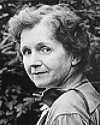
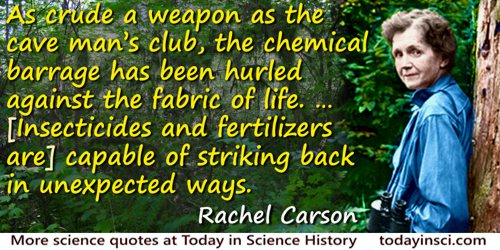
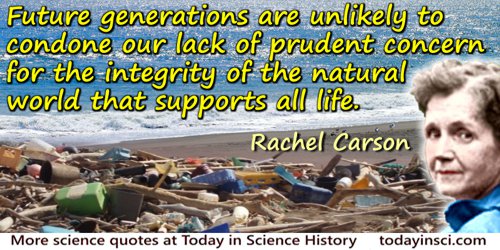
![Rachel Carson quote: In that dawn chorus [of birds] one hears the throb of life itself.](https://todayinsci.com/C/Carson_Rachel/CarsonRachel-Dawn500x250px.jpg)
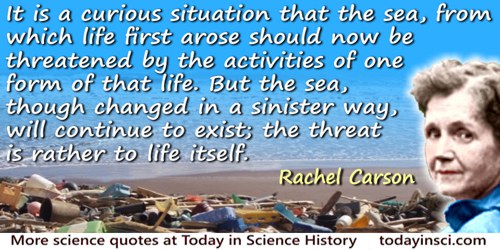
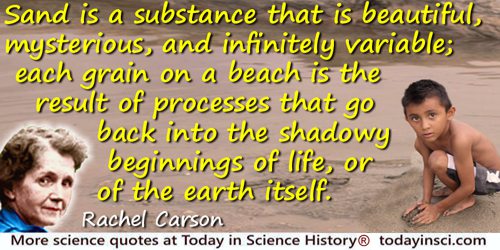
![Rachel Carson quote: In that dawn chorus [of birds] one hears the throb of life itself.](https://todayinsci.com/C/Carson_Rachel/CarsonRachel-DawnThm.jpg)
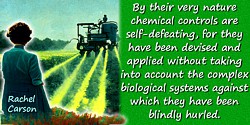
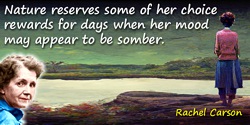
 In science it often happens that scientists say, 'You know that's a really good argument; my position is mistaken,' and then they would actually change their minds and you never hear that old view from them again. They really do it. It doesn't happen as often as it should, because scientists are human and change is sometimes painful. But it happens every day. I cannot recall the last time something like that happened in politics or religion.
(1987) --
In science it often happens that scientists say, 'You know that's a really good argument; my position is mistaken,' and then they would actually change their minds and you never hear that old view from them again. They really do it. It doesn't happen as often as it should, because scientists are human and change is sometimes painful. But it happens every day. I cannot recall the last time something like that happened in politics or religion.
(1987) -- 


